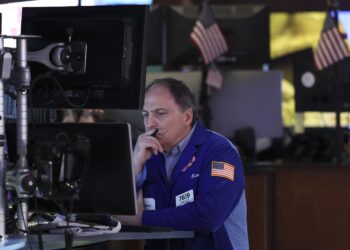US stocks suffer worst quarter since 2022 amid tariffs fears
Two major US stock indexes ended their worst quarter in over two years, with the S&P 500 dropping 4.5% and the Nasdaq dipping 10.4%.The Dow Jones dropped 1.3%, marking its first consecutive monthly loss since October 2023, as the broader market faces uncertainty ahead of Trump’s new tariffs.
unbranded – Newsworthy
Retiree Mary Johnson, 73, said she doesn’t usually check her retirement accounts when the markets are in a freefall, but she couldn’t “remember a fall this deep.”
On Friday, when the blue-chip Dow dropped 2,231 points, or 5.5%, and the broad S&P 500 and the tech-heavy Nasdaq each shed almost 6%, “I did grit my teeth and just checked it,” said Johnson, who retired last year.
What did she find?
The stock freefall on April 3rd, followed by another drubbing the next day due to shock and worry over President Donald Trump’s aggressive tariff plan “knocked me back about an estimated $6,000 in income for 2026,” she said. “That’s money that’s needed to replace an aging roof on (my) house, among other things.”
On Wednesday, stocks rallied strongly when Trump put a 90-day hold on most of his most aggressive tariffs, but stocks remain down for the year and their outlook is murky. Stocks swooned again the next day because no one knows what will happen when the 90 days are up. Investors have learned well the past week, stocks can turn violently one way or another in an instant.
“The current situation is not only chaotic, it’s crazy,” said ING Economist Carsten Brzeski.
Americans about to retire, recently retired or deep into retirement may feel they’re sunk after the latest stock market gyrations, but experts say don’t panic.
“Don’t make an emotional or knee-jerk reaction,” said Nick Bour, founder and chief executive of Inspire Wealth in Brighton, Michigan. “During Covid, stocks went down really fast, but they also came back really fast. If you get out, you could miss the big bounce back.”
What’s happening in the stock market?
On Thursday, April 3, the Dow lost 1,679.39 points, the S&P 500 shed almost 5% and the Nasdaq dipped nearly 6% after Trump announced his long-awaited tariff plan late the day before. Tariffs included a sweeping 10% levy on all countries, effective April 5, and even higher reciprocal tariffs on a host of countries starting April 9.
Stocks continued to plunge as countries denounced Trump’s tariffs and threatened retaliatory tariffs. China matched Trump’s 34% tariff, to start April 10. Trump later escalated his China tariff to 125%. In total, the White House said on Thursday tariffs on China were 145%, including an earlier fentanyl-related 20% tariff.
The stock market saw its largest decline last week since the start of the COVID-19 pandemic in March 2020 amid worries for a potential all-out trade war. The Dow lost nearly 4,000 points over April 3 and 4, and stock indexes continued to drop the following Monday.
This week, stocks rebounded strongly on Wednesday after Trump paused most reciprocal tariffs, except the ones on China, but they’re still down for the year and resumed their slide on Thursday. Worries about a trade war with China erased optimism stemming from the 90-day pause for other countries.
What should retirees or those near retirement do?
“Giving advice to not panic during severe market downturns is often customary and can frankly seem a bit boilerplate,” said Marc Zabicki, chief investment officer and director of research at LPL Financial. “We get that. But it is perhaps the most important piece of advice financial consultants can give because it is during times of market turmoil when many investors get it wrong.”
“If you’re not retired yet, probably hold for a minute, take a pause,” Bour said. “If you’re earning money, you don’t have to tap retirement accounts yet.” Hanging on to your job for another three to six months buys you some time to see how things settle, he said.
People who sell in a market downturn during their late working years or early retirement to meet income needs may face “sequence risk,” meaning they deplete retirement savings faster than anticipated, potentially leading to a shortfall in later years. Studies show the order and timing of poor investment returns can have a big impact on how long your retirement savings lasts.
- If you need cash, consider your options.
Consider refinancing a mortgage if you have one.
“The question I’ve been working with for several months now is whether to refinance,” Johnson said. “I currently pay a mortgage rate of less than 3%. But keeping a roof over one’s head forces us to think the unthinkable. With the…market rout, mortgage rates are going down.”
Bour said he’s already in the process of refinancing “to free up some cash flow. We have some cash on hand, but that is mostly emergency fund money.”
Another option is a home equity line of credit, or HELOC. “If you need $10,000 for three or four months, this could help people out because rates are low, but you have to pay it back,” Bour said. “Some retirees don’t want debt, but it’s not a bad thing. It’s better than selling low on investments.”
Have Americans heeded this advice so far?
Companies that track 401(k) and individual trading activity show many Americans have stayed invested and even poured more money into the downdraft.
- On Thursday, April 3, when markets first swooned on Trump’s tariffs, investing platform Wealthfront said deposits into its globally diversified index investment accounts jumped more than 330% from the previous day, and deposits into its individual stock investment accounts were up by nearly 500%. Nvidia, Amazon and Apple were the most popular stocks purchased, it said.
“This increase in investment deposits is likely due to investors ‘buying the dip’ and shows that clients are continuing to invest through volatility,” Wealthfront said. Investment deposits are still elevated, it added.
- “Despite a sea of red, retail investors stood firm and not only bought the dip but did so at a historic pace,” wrote JPMorgan analysts led by Emma Wu last week. Thursday, April 3 saw $4.7 billion of net buying, the largest level over the past decade, they said.
- Bank of America said on Tuesday its clients were also net buyers of $8.0 billion of U.S. equities last week. That was the fourth-largest weekly inflow in Bank of America’s data history since 2008 and the 31st largest as a percentage of market cap, it said. Clients of all types bought both single stocks and exchange traded funds, it said.
- Benefits record-keeper Alight Solutions said Monday saw the highest activity since March 12, 2020, the start of the COVID-19 pandemic. It was also almost 10 times the usual trading seen in 401(k) accounts. Savers pulled money from U.S. stocks and target-date funds and shifted into safer bond and money market funds, Alight said.
“I learned from the Great Recession that I waited far longer than I should have and missed some investing opportunities,” Johnson said. “I tend to be a buy and hold investor. I buy large cap companies with top credit ratings, a good dividend and a good ten-year total return record. Investing in stocks paying a good dividend is important right now because in essence, the company is paying you to be patient and hold their stock.”
Medora Lee is a money, markets, and personal finance reporter at USA TODAY. You can reach her at [email protected] and subscribe to our free Daily Money newsletter for personal finance tips and business news every Monday through Friday.


















